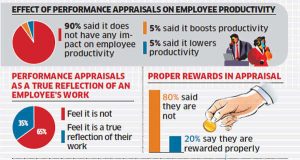Performance measurement and systems have proliferated in the past 20 years, with executives in both the private and public sectors relying on performance metrics for strategic planning, and decision-making to drive bottom line results.

Yet research by reveals for the most part performance management systems have been a failure in most organizations, according to the Maastricht School of Management, The CEB, Watson Wyatt, and The Society for Human Resource Management.
Part of the problem is that leaders in those organizations still cling to some myths regarding performance management. So argues Pietro Micheli, professor of organizational performance at Britain’s Warwick Business School. He argues that the myths and mistakes “often encourage exactly the behaviours their organizations neither need or want.”

Here’s a brief summary of the myths:
Myth 1: Numbers are objective. Performance data is in fact “ambiguous and open to interpretation, and it’s use and impact on performance depends on commonality of interpretations.”
Myth 2: Accuracy and precision. Organizations invest huge amounts of money to gather data to manage performance, but ask themselves the wrong question. Instead of asking whether the data is of good quality, the question should be “are we getting the data that is good enough for our purposes?” or in other words, are the data connected to strategic objectives?
Myth 3: Added value. Performance data is often never used in organizations, or in other words, the data is not used to make new decisions only reinforce.
Myth 4: Alignment. Recent studies show, while organizations are making considerable efforts to align employee behaviours and actions, Micheli contends, their results are often dismal because they are initiated top-down in a rigid fashion with no discretion left to employees.
Myth 5: Motivation. Performance targets, indicators and rewards are often used to focus attention, and engage and motivate staff. Yet, despite good intentions, organizations often generate what he calls a vicious cycle of performance management: “The usual reaction is to quickly introduce a series of measures to gather ‘objective’ data and to attach rewards to specific targets to incentivize employees. Unfortunately, as a result of this people get measure fixated.” They do a good job hitting the target but lose touch with the underlying objective or goal. Then over time a culture of performance measurement emerges which employees blindly follow. They work on what is measured, blind to the organization’s overall success.
Myth 6: Enabling change. Many organizations use performance targets and indicators to kick-start the implementation of change, but measurement systems “have often acted as obstacles rather than enablers,” Micheli argues, adding that a rigid system regulated by managers often dampens employee initiative, rather than adopting an empowering and flexible approach.
Myth 7: Improvement. While the ultimate goal of using a performance measurement system is to improve organizational performance, Micheli’s research shows that the impact on performance is often non-existent, when they are not used to promote employee learning and creative collaboration.

“Rather than spending months designing the perfect system that can produce objective, accurate and precise data, efforts should be put in communicating to all employees the reasons and benefits of such systems, and connecting strategy, measurement and decision-making,” Micheli concludes.
And more importantly, rather than assuming that a tight set of measures, targets and rewards will lead to alignment, motivation and improvement, “managers should empower people at different hierarchical levels, build flexibility in these system and use them for learning, rather than control purposes.”
I’d like to share final word as an executive coach who works with high performance individuals in the C-Suite. My experience has been that real significant gains in performance comes as result of intensive work on inner growth—things like self-awareness, self management of emotions, and mastering mindfulness—rather than some formula driven system that produces mediocre results.
Copyright: Neither this article or a portion thereof may be reproduced in any print or media format without the express permission of the author.
Read my latest book: Eye of the Storm: How Mindful Leaders Can Transform Chaotic Workplaces, available in paperback and Kindle on Amazon and Barnes & Noble in the U.S., Canada, Europe and Australia and Asia.


